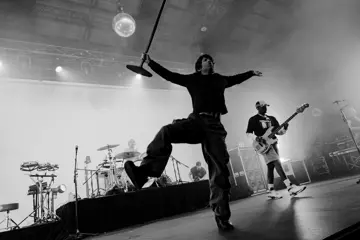
Imagine an immaculately accurate Sex Pistols tribute band — one so prodigiously talented and studiously rehearsed that they are capable of reproducing the amateur musical abilities of the original band in some soulless facsimile.
Tonight, Christopher Brett Bailey offers an admirable portrayal of what it is like to feel something — disdain, disgust, disinterest — by a talented but emotionless mimic. Bailey lacked the conviction to learn his rant by rote (despite numerous runs in the UK since its May 2014 premier), arguably part of the character (an amalgam of beatnik and neckbeard), the stack of paper from which Bailey reads reveals both its meticulous construction and his lack of any real emotional investment. This is not the detached cool of the cats making beat and jazz happen, but the nihilistic loop of the Springfield teenager at Lullapalooza, who doesn't even know if he's being sarcastic anymore.
The appeal of the likes of Lenny Bruce and Bill Hicks (both obvious influences on Bailey's style, alongside an injection of distanced critical apathy lifted straight from Tumblr) was the way they embodied their vitriol, truly lived it in an inescapable sense. Their comedy was a necessary reaction to their experience of trying to exist in a world made increasingly absurd by censorship and moralising — it was a coping mechanism; this feels like a schtick.
At its best, Bailey's quick wit and tongue spit the oratory tradition at and into the World Wide Web — in these moments he is ferociously inquisitive of himself, the stories he tells, the clichés that pepper them, and the very act of story telling itself. At its worst, it feels like the grunts of a tennis match overdubbed by a helium balloon-huffing Burroughs.
Don't miss a beat with our FREE daily newsletter















